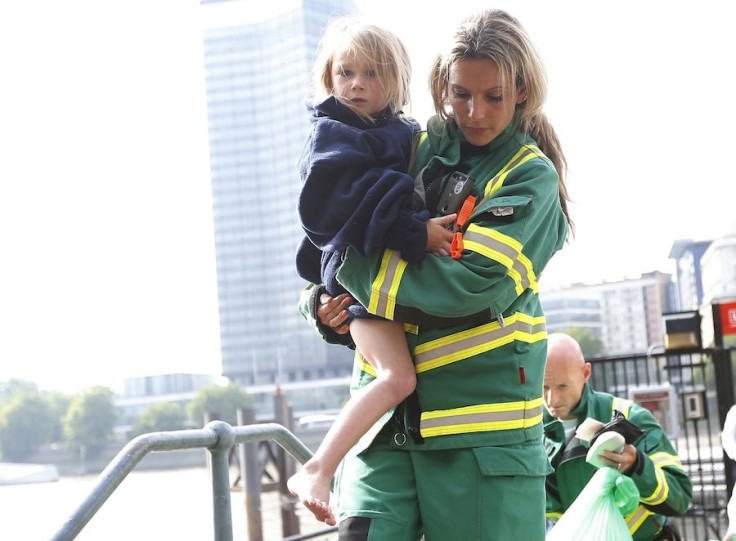London Duck Tours Boat Catches Fire, Sends 28 Tourists Into River Thames

It’s an amphibious pleasure boat that’s supposed to drive on land and float on water, but one London Duck Tours vessel could barely move Sunday after it caught fire and sent 28 tourists diving to safety in the River Thames just yards from the Houses of Parliament.
The passengers, including some as young as 6 years old, dove into the Thames as smoke billowed out of the vessel, spurring fears of an impending explosion. “A number of people jumped into the water, but they were soon rescued and fortunately at this stage it doesn’t look like anyone’s been seriously injured,” said Neil Withers of the London Fire Brigade. “People are clearly cold, wet and in shock, but they were pulled from the water really quickly, and that’s testament to the work of our firefighters, other emergency rescue teams and others who rushed to the scene to help.”
Withers added that the bus-boat hybrid was about 33 percent destroyed during the incident. The fire brigade towed it to shore Sunday afternoon.
London Duck Tours said the “distressing situation” happened aboard the ship Cleopatra just before noon local time (7 a.m. EDT), but added that all passengers were safe and sound. Three tourists who were taken to St. Thomas’ Hospital for minor smoke inhalation, including a pregnant woman, were all discharged by Sunday evening, according to local authorities. Paramedics treated others at the scene for the effects of cold and shock.
“We would like to thank the company’s crew, the emergency services and the fellow boat operators who all attended the scene for the excellent service and response they provided as part of the evacuation procedures,” London Duck Tours Managing Director John Bigos said in a statement.
Bigos noted that beginning Monday London Duck Tours would run a “land only service” until it can establish the cause of the fire. He added that the popular tour operator runs “a fully modernized fleet of nine vehicles that have been completely rebuilt and refurbished between 2002 and 2012,” including purpose-built hulls, new engines, computerized systems and steering equipment.
Bigos said the company was fully cooperating with investigators and regulatory authorities, but would not make any further comment until the Port of London Authority completes its investigation. He said comparisons in the media with incidents on another amphibious vessel in Liverpool were completely unfounded as they happened with a separate company, the Yellow Duckmarine.
The entire Yellow Duckmarine fleet was ordered out of the water in March after a vessel sank with no passengers aboard. Three months later, rescue teams saved 28 passengers after another Duckmarine tour vessel sank near Liverpool’s Albert Dock. Seventeen tourists went to a Liverpool hospital for treatment, and the company lost its license thereafter, according to local reports. A message on the company’s website says it’s “unable to run tours at present.”
The Yellow Duckmarine incidents put increasing pressure on the British government to review the safety of amphibious craft, which are based on a military design dating back to D-Day. So-called “duck tours” have also come under scrutiny in the U.S., where in 2010 two members of a Hungarian tour group were killed following an engine fire that disabled a Ride the Ducks amphibious bus on Philadelphia’s Delaware River. The families of the victims in that case reached a $15 million wrongful-death settlement last year.
© Copyright IBTimes 2024. All rights reserved.












